“Wow, cool!” That’s what I said when AudioCulture asked me to do a part two to Steven Shaw’s December 2018 original article.
Where do I start? Like Steven said in his article, there are so many notable bass moments in New Zealand music, and yeah, compiling a list of only 10 is difficult, not for finding contenders, but for what to leave out. So many will also not make my list, but I’ll do some honourable mentions as a way to sneak a few extras through!

Mark Hughes. - Photo by Sara Thorburn.
What makes a great bass moment in music? It can be a lot of different things, and different things for different people. A lick, a groove, a fill, a certain sound, or sonic texture, so many things fit the criteria.
But I’ve decided to go with the groove, for the most part. Being a bass player, it’s the thing that captures my ear. Sometimes it’s almost invisible, but without it, the song wouldn’t be the same.
The groovy bass part is what bass players strive for. That’s what I strive for when I play, and that’s what my bass heroes do too. It may not have any flash, glitz and dazzle or glamour, if anything it often goes unnoticed. But if it makes the song feel right and the listener move, then it’s mission accomplished!
What is a groove? It’s the feel, the vibe, the intention of the part, of the song. It’s the thing that makes the music somehow seem right. It’s abstract, but very real at the same time. It’s playing notes, but also not playing notes, playing the space. The absence of sound is so powerful, if not more powerful than making a sound. Micromanagement of the loud and quiet parts of the sound. When all, some, or one these things line up, the music can come to life, regardless of genre. Bach was a groove master, and so was Tiny Tim! Groove exists outside of the execution. Notes and rhythm don’t make a groove: the human element, the imperfections, that’s where it’s at. The perfect take in the studio might not have it, the imperfect take is often the one.
So, my top 10 Kiwi bass moments are bass parts that caught my attention and have stayed with me. In no real order, let’s go!
--
Strawpeople – Sweet Disorder
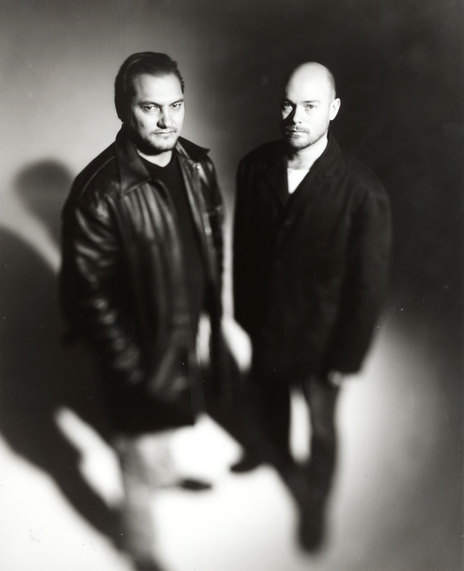
Mark Tierney and Paul Casserley, Strawpeople
An acoustic double bass starts the song and then the vocals join in. What initially sounds like a contemporary jazz tune from Strawpeople changes as soon as the rest of the track kicks in: pure pop! This was something quite fresh, different and cool back in 1995 in the world of electronic pop music.

Steve Harrop, pictured on upright bass at Cause Celebre, 1990s, with Nathan Haines and the Enforcers. - Simon Grigg
I guess it fitted with the acid jazz thing that was going on at the time. Loops, drum machines, samples, a warm silky vocal from Leza Corban, and that bass! So cool. A repetitive groove. A fat and rich, clear double-bass tone played by Steve Harrop. This stuck out to me and many others back in the day and is still a killer track. A pop song that starts with the bass and has it as a major hook!
Jon Stevens – Jezebel
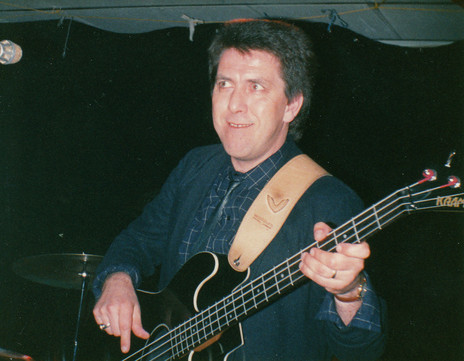
Clinton Brown: the space is the trick. - Glen Moffatt collection
The debut single from young New Zealand singer Jon Stevens has a cool disco vibe, as did many in 1979. That disco-ness is driven by the bass groove played by Clinton Brown, a first-call bass player if there ever was one. (Actually, there are a bunch in New Zealand, then and now). This is a great example of a groove. A simple idea. A long note, a space, a couple of short notes, another space. Not that this is a formula, but it almost is. The space is the trick on this one. Clinton plays the space as much as he’s playing the notes. The space draws you in, creating anticipation for the next note.
Also check out 'Montego Bay', lots of space again.
The Gordons – Adults and Children
A bit of a left turn, but I’ve always loved this song and the bass. Released in 1981, full-on post punk raucousness from The Gordons. But it’s another example of groove. The groove here is in the vibe, the intention, the urgency of the bass part. Overdriven to hell, an aggressive bass tone. It drives the song. This makes my foot tap and my head start to bob.
Herbs – Sensitive To A Smile
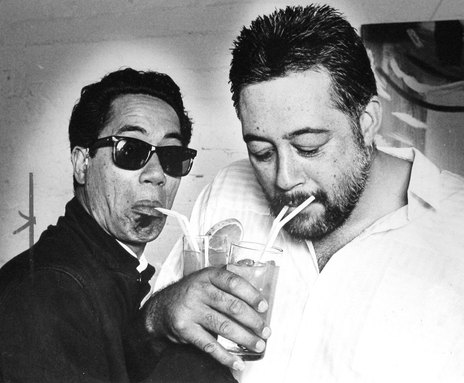
Herbs' bassist Charlie Tumahai and guitarist Dilworth Karaka.
Amazing vocals and bass playing on this one from the late Charlie Tumahai. Released in 1987 by Herbs, Charlie uses long and short notes in the intro and verses, with smatterings of tasty, simple, and perfectly executed fills. He then shifts gear in the chorus to create more movement with short notes and space. He plays the space, giving space the same respect and value as the notes. Nothing for the first two 16th notes of each beat, then short notes on the “+” and “a” at the ends of the beats an octave apart. What are “+” and “a”? They are where the magic is! The last two subdivisions of the beat. He then changes it up again in the solo section. Long held notes, outlining the major chords so simply and melodically, to let the sax solo shine. That’s a great bass player. Using his ears, taste, and judgement to adapt the bass part and make everyone else sound better.
Split Enz – Bold as Brass
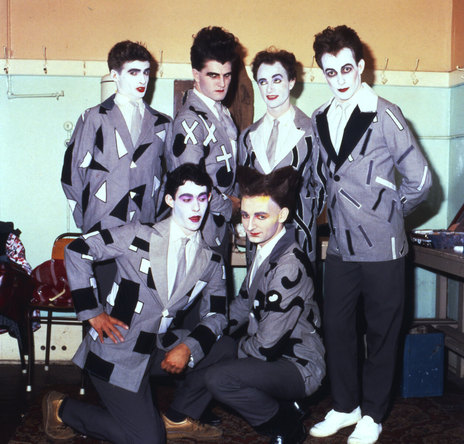
Split Enz, 1977 - back: Neil Finn, Tim Finn, Nigel Griggs, Eddie Rayner; front: Malcolm Green, Noel Crombie.
Where do you start with Split Enz? So many cool bass parts to choose from. This is a favourite of mine. ‘Bold As Brass’ is from the 1977 Split Enz album Dizrythmia. Vocals by Tim Finn and the bass is played by Nigel Griggs. The track starts with an almost country music kind of vibe then goes into punkish pop weirdness that drives everything along. The picked bass pedals along, droning a note, and hinting at moving, but it stays put, and then opens up to a syncopated groove with plenty ghost notes and chromatic runs. Awesome, tension, atonal weirdness, more tension. The chorus arrives and lets the listener off the hook, releasing us back to that almost country thing again. Masterful.
Here are a bunch of other notable Split Enz bass moments from Nigel Griggs:
Shark Attack
One Step Ahead
Dirty Creature
Strait Old Line
Fur Patrol – Lydia
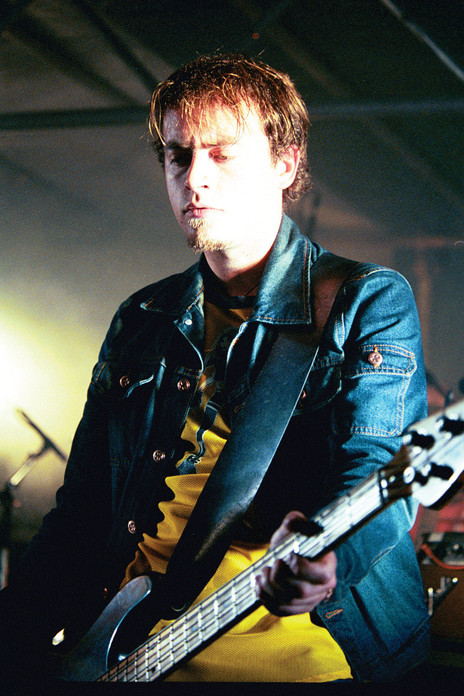
Andrew Bain, Fur Patrol: restraint.
A simple drum and bass groove and a beautiful vocal are the only things going on at the start of this classic from Fur Patrol, and they take us all the way through until the second verse. Long notes, spaces, (there’s that space thing popping up again). The simple groove lets the intimacy of the vocal shine through. Restraint in the playing for most of the song, opening up a little in the choruses then ramping up for the final chorus. So good!
Shihad – The General Electric
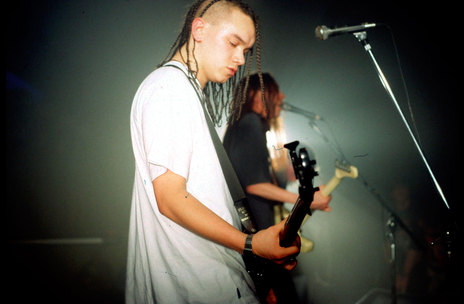
Karl Kippenberger - Churn tour, Powerstation - Photo by Murray Cammick
Shihad – one of the best New Zealand rhythm sections, I reckon. Karl Kippenberge’s bass part doubles the heavy guitar riff initially, but then gets to really shine in the verses. The same bassline continues, perfectly in the pocket with the drums, and Karl adds riffs and fills at the end of the main phrase. A great deep bass tone, I think Shihad dropped their guitar tunings to get that fatter sound. The tension of the verse groove is finally let go in the chorus. I always loved Shihad’s pop sensibility in a lot of their tunes.
Also check out ‘You Again’, a heavy riff with a fantastic feel. This whole band grooved!
Supergroove – Can’t Get Enough
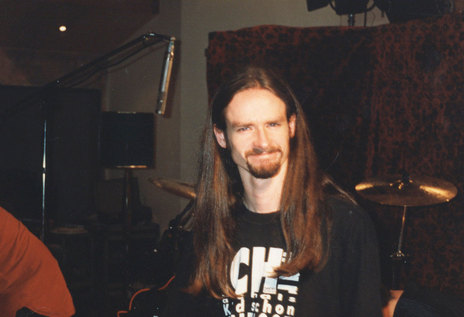
Supergroove bassist Joe Lonie at York Street: anticipation.
Joe Lonie’s funky bass part pushes this Supergroove hit along. Again, a simple part but so effective. The first couple of beats are sparse note-wise, and the end of the bar gets ever so slightly busier, filling the sound just a touch before bringing the space back in. Once more the space and build creates the anticipation for the following bar. The bass gets busier later as the song takes a left turn to the New Orleans street party vibe which takes us to the end. Great playing. And considering these guys were super young at the time, the maturity in the playing is impressive.
Also check out ‘You Gotta Know’
Exponents – Erotic
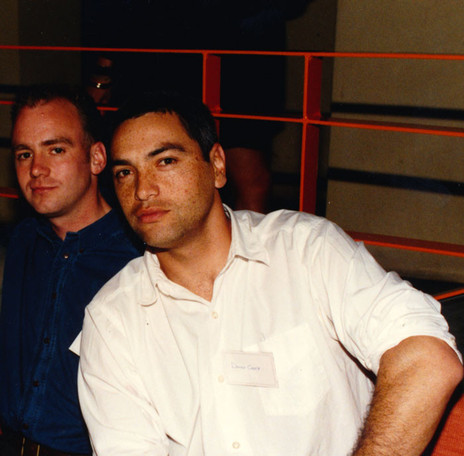
Brian Jones and Dave Gent from The Exponents: intuition.
Bassist Dave Gent is grooving hard on this Exponents tune. This is an example of feel and attitude making the bass part work so well. It glues the drums to the guitars and vocals. It’s another simple part, but simple doesn’t equate to easy. Dave naturally knows how to make this sit right in the song. That intuition is what makes this groove. You can’t teach that, but you can learn from it.
Also check out ‘Sex & Agriculture’. Great playing.
Che Fu – Fade Away
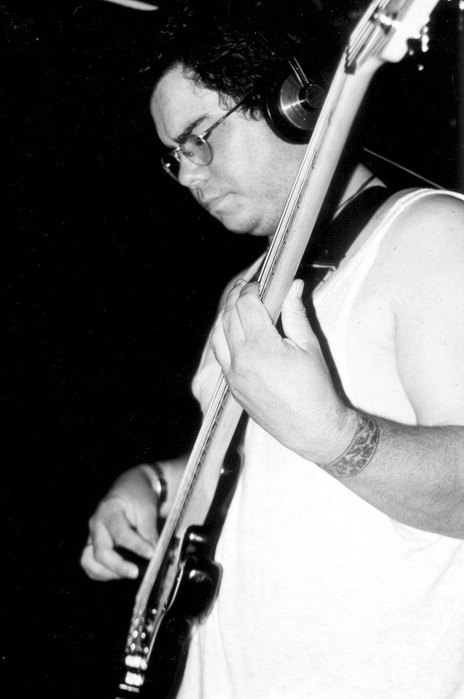
Chip Matthews: relief to the tension.
Fantastic playing by the mighty Chip Matthews on this one from Che Fu’s Navigator album. A deep reggae feel smattered with unison riffs with guitars. And the bass occasionally follows the vocal melody, adding another dimension to the part. Plenty of space, sparse notes in the verses. It opens up in the choruses with the notes getting longer, giving relief to the tension of the verses. Beautiful placement of the bass notes.
--
So that’s my list of 10 moments in New Zealand bass. Have a listen to them, hopefully you have understood my explanations of what’s going on with these bass grooves and get why I’ve listed them as being special to me. Here are a few other notables – all great bass parts in my book.
Ardijah – Give Me Your Numba
Ryan Monga thumpin and plucking like a monster!
The Crocodiles – Tears
Bass part by Mark Hornibrook, who weaves through the chords and key changes.
Mi-Sex – Blue Day
I love the harmony in Don Martin’s bass lines here.
L.A.B. – In the Air
Tasty groovy playing by Ara Adams-Tamatea.
Th’Dudes – Be Mine Tonight
Lez White shows we should never underestimate the root note/fifth note bass part, so good!
Dave Dobbyn – Slice of Heaven
Programmed keyboard bassline.
--
Based in Auckland, bassist Mark Hughes has performed live and recorded with some of New Zealand's greatest musicians, including Greg Johnson, Dave Dobbyn, Tim Finn, Bic Runga, Gin Wigmore, Carly Binding, Strawpeople, Jan Hellriegel, Boh Runga, Kurt Shanks, Jackie Clarke, Annie Crummer, Dinah Lee, Rikki Morris, Ted Brown, Chet O'Connell, Midge Marsden, Tami Neilson, Delaney Davidson, Barry Saunders, Victoria Girling-Butcher, Auckland Philharmonia Orchestra, and Hands Off, one of New Zealand’s top corporate cover bands.